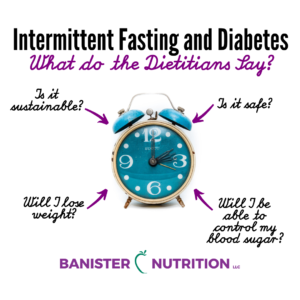Intermittent Fasting (IF) and Diabetes
Intermittent Fasting (IF) is a diet that cycles between periods of fasting and non-fasting. Some Type 1 and Type 2 diabetics use IF in attempts to lose weight or decrease blood sugar levels. This dietary strategy that focuses on when you eat, rather than what you eat.
Fasting may be for days or a few hours during the day. Three of the most popular IF methods include:
- 16:8 method: This strategy focuses on skipping breakfast and restricting the daily eating period to 8 hours followed by a 16 hour fast in between.
- Eat-Stop-Eat: This strategy focuses on fasting for 24 hours, once or twice a week, for example by not eating from dinner one day until dinner the next day.
- 5:2 method: This strategy focuses on consuming only 500–600 calories on two non-consecutive days of the week, but eat normally the other 5 days.
The purpose behind IF is to reduce total calories consumed to produce reductions in weight, glucose, and A1C. Current studies have shown IF and continuous caloric restriction both produced similar weight loss results.
Sustainability and safety of any weight loss strategy are imperative to its success.
For people with Type 1 and Type 2 diabetes, there are several factors to consider such as high-risk glycemic events and medication management. Those being treated with insulin or sulfonylureas such as glipizide, glyburide or glimepiride are at risk of hypoglycemic events. Hyperglycemic events as serious as diabetic ketoacidosis (DKA) may occur during periods of non-fasting if carbohydrate consumption is too high or medications are adjusted incorrectly.
If an individual with diabetes is considering IF the keys to the safety of this method include:
- Closely monitoring blood glucose to catch and treat low blood sugar events
- Extensively review of nutrition and carbohydrate management
- Adjusting medication dose and schedule, when necessary
- Adjusting exercise
- Reviewing hypoglycemia risk, symptoms, treatment
- Increasing awareness of the potential to overeat after periods of fasting.
Common side effects from fasting are decreased energy, continual hunger, and irritability which may interfere with one’s desire to continue this plan. Currently, there is not enough evidence to support the benefits of IF versus the potential consequences for people with diabetes.
If you have diabetes and you’re exploring IF, contact Banister Nutrition.
CB

